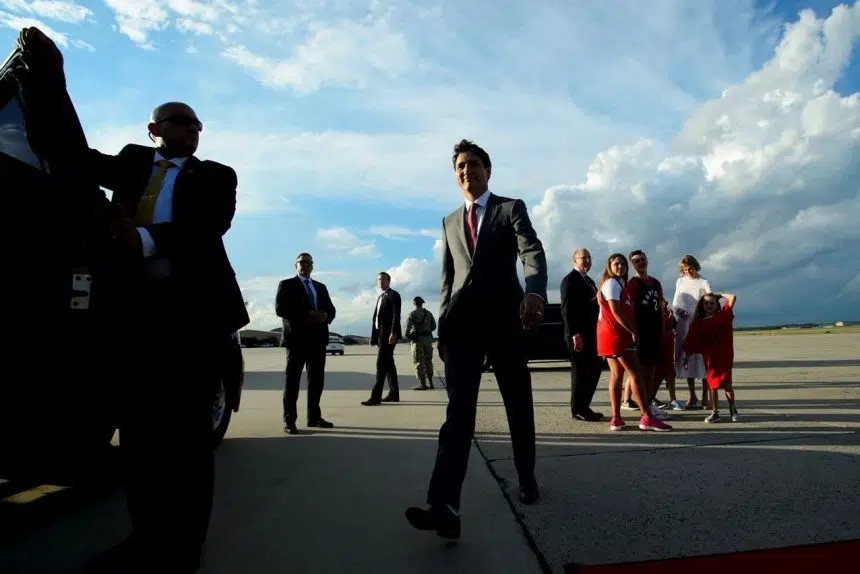U.S. President Donald Trump signalled Thursday that he will raise the issue of two Canadians detained in China when he meets with the Chinese president next week.
The two Canadians have been languishing behind bars in China since shortly after Canada arrested high-tech executive Meng Wanzhou late last year at the behest of U.S. authorities.
Speaking to reporters as he and Prime Minister Justin Trudeau sat in the Oval Office, Trump vowed to do whatever he could in the cases of Michael Spavor and Michael Kovrig when he meets China’s President Xi Jinping at next week’s G20 leaders’ summit in Japan, if Trudeau — as expected — asks for his help.
Canada has been caught in the crossfire after the RCMP arrested Meng last December in Vancouver, where she awaits extradition south of the border to face allegations of fraud in violating Iran sanctions.
Trudeau doesn’t have a planned meeting with Xi, unlike Trump. The U.S.-China meeting next week is focused on a trade deal.
“We have a meeting set up with President Xi and it’s obviously on the big transaction that we’re talking about and negotiating. Our people are actually speaking now. We’ll see what happens, but anything I can do to help Canada I will be doing,” Trump told reporters in the White House.
“I would, at Justin’s request, I will actually bring it up.”
Trudeau’s trip to Washington, including his third Oval Office visit since Trump was elected in 2016, is aimed primarily at pushing the new North American trade agreement over the finish line in both countries.
Canada has started the ratification process, with legislation making its way through Parliament. Lawmakers in Mexico voted Wednesday in a landslide to ratify the deal, which U.S. Trade Representative Robert Lighthizer called “a crucial step forward.”
Trump needs to persuade his Democratic opponents in the House of Representatives — in particular Speaker Nancy Pelosi — to allow the actual start of the ratification of the U.S.-Mexico-Canada Agreement (USMCA).
Pelosi and her fellow Democrats want stronger enforcement mechanisms for the deal’s new labour and environmental provisions — and Trudeau’s visit might be just the thing needed to pry loose her support.
Trump sounded upbeat in the Oval Office, saying he expected Pelosi and the Democrats would “do the right thing” and back the deal in Congress.
“Let’s see what happens, but I really believe that Nancy Pelosi and the House will approve it, I think the Senate will approve it rapidly. It’s going to be very bipartisan,” the president said.
“I hope politically they can do what they have to do. Now, the day after the election, it would win with a tremendous support, but we have an election coming up, but I think Nancy Pelosi is going to do the right thing.”
Canada, meanwhile, has been building strong support for the new NAFTA and open borders within the U.S. and it has many American business allies in its corner.
“It’s an opportunity for us, as you say, to keep talking about how we worked hard to build a great trade deal that’s good for Canadian workers, good for American workers, good for Mexican workers as well. We’re moving forward on the ratification process aligned with you,” Trudeau told Trump.
Trudeau met with Pelosi shortly after his White House visit. Speaking on Capitol Hill, Pelosi said she looked forward to a “lively discussion” on global security issues and the economic relationship between the two countries, particularly regarding trade.
“Canada is our trusted neighbour, our relationship is a warm one and it is an honour again to have the prime minister visit,” she said.
The prime minister’s day could prove to be a pivotal visit to the U.S. capital not only for North American trade and Canada’s strained relationship with China, but for the campaign-bound prime minister himself. An earnest end to the tensions between Trudeau and Trump, which erupted into full view following last year’s G7 summit in Quebec, could prove useful to the governing Liberals when Canadians head to the polls this fall.
Trudeau called the meeting with Trump “a really great opportunity” for the two countries “to build on the closest alliance in the world.”
“Obviously today as well, on top of the great news in the Canadian and American economies, we’re continuing the work on a broad range of global issues,” the prime minister added.
The two leaders said they will discuss the situation with Iran, whose Revolutionary Guard shot down a U.S. surveillance drone on Thursday morning. The move sparked competing and unverifiable accounts over where the downing occurred and deepened a conflict between the U.S. and Iran. The Guard said the drone was over Iranian airspace and U.S. said it was over the international Strait of Hormuz.
“Iran made a big mistake. This drone was in international waters, clearly, we have it all documented, it’s documented scientifically, not just words, and they made a very bad mistake,” Trump said.
Trump later said he believed that it might have been a rogue commander who made an error by shooting the down the unarmed, unmanned drone. Asked how the United States would respond, Trump said, “let’s just see what happens. … It’s all going to work out.”
Canadian soldiers are in nearby Iraq as part of a NATO effort to train Iraqi military forces.
“Obviously, we’re very concerned about the escalation by Iran recently,” Trudeau said.
“We look forward to discussing with our closest ally their perspectives on this and how we can move forward as an international community.”
Mike Blanchfield, The Canadian Press







